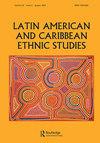Black women’s geographies of resistance and the Afro-Ecuadorian Ancestral Territory of Imbabura and Carchi
IF 1
Q4 ETHNIC STUDIES
引用次数: 1
Abstract
ABSTRACT This article explores the political project of the Afro-Ecuadorian Ancestral Territory of Imbabura and Carchi, advanced by the members of the Coordinadora Nacional de Mujeres Negras del Ecuador (CONAMUNE; National Coordination of Black Women of Ecuador) in the northern Ecuadorian highlands. I show how Black women resignify their past and assert their sense of place in an Andean region widely considered Indigenous. That region is marked by racial exploitation and land dispossession, and the political project of nation-building based on the ideology of mestizaje. Black women of CONAMUNE create a space for dialogue between Afrodescendant social organizations and the state, while engaging with Indigenous territorial projects. These Black women strengthen and mobilize diasporic identities by emphasizing the African blood spilled on the soil by their ancestors and the participation of Black enslaved women in the struggle for freedom. I argue that the Ancestral Territory project entails an ongoing geographic struggle in which Afrodescendant women create a particular sense of place as they live and imagine a geography of resistance.黑人妇女的抵抗地理与非裔厄瓜多尔人的祖先领地Imbabura和Carchi
摘要本文探讨了厄瓜多尔黑人全国协调会(CONAMUNE;厄瓜多尔黑人妇女全国协调会)成员在厄瓜多尔北部高地提出的非裔厄瓜多尔人祖先领地Imbabura和Carchi的政治项目。我展示了黑人女性如何放弃自己的过去,并在被广泛认为是土著的安第斯地区维护自己的地位感。该地区的特点是种族剥削和土地剥夺,以及基于梅斯蒂扎耶意识形态的国家建设政治项目。全国妇女委员会的黑人妇女在参与土著领土项目的同时,为非洲社会组织和国家之间的对话创造了空间。这些黑人妇女通过强调祖先洒在土地上的非洲鲜血以及被奴役的黑人妇女参与争取自由的斗争,来加强和动员散居者的身份。我认为,祖先领地项目需要一场持续的地理斗争,在这场斗争中,非洲裔女性在生活和想象抵抗的地理环境时创造了一种特殊的地方感。
本文章由计算机程序翻译,如有差异,请以英文原文为准。
求助全文
约1分钟内获得全文
求助全文
来源期刊

Latin American and Caribbean Ethnic Studies
Social Sciences-Cultural Studies
CiteScore
1.30
自引率
16.70%
发文量
22
 求助内容:
求助内容: 应助结果提醒方式:
应助结果提醒方式:


